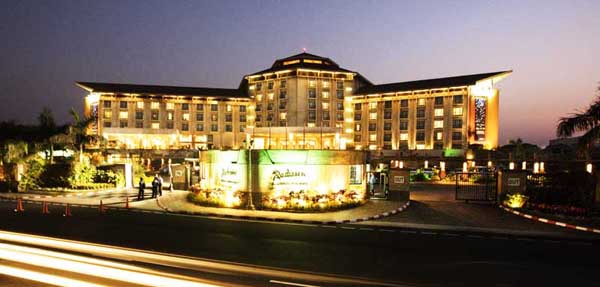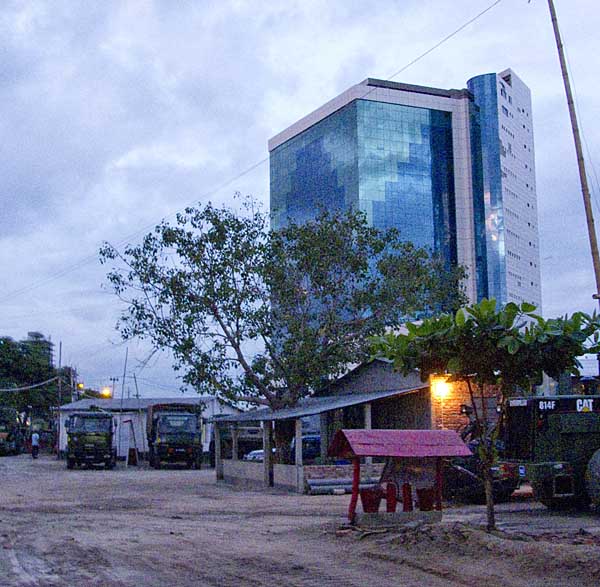Subscribe to ShahidulNews
![]()

By Kamal Ahmed
BBC News, Dhaka
The army is becoming increasingly involved in business activities.?The Bangladeshi army has over the years played a key role in the country’s political life, but it has now also emerged as a major player in the business arena, with interests spread across all the major sectors of the economy.
Following the example of the Pakistan army, it has been thriving under successive civilian governments. But there are now signs of unease about it within the force itself and within wider society.?Evidence of the army’s wealth and influence is not hard to find.?The five star Dhaka Radisson hotel – which offers guests use of the nearby deluxe army golf course – is owned by the Bangladesh Army Welfare Trust (AWT) and was established on military land.
‘Commercial advantage’
There are five other top hotels in Dhaka, but none can provide a package that exploits military real estate.
The military’s interests include the hotel and hospitality trade.?Capitalising on its success with the Dhaka Radisson, the AWT is now building another five-star hotel in the port city of Chittagong.
A leading hotelier who did not wish to be identified told the BBC that the use of cheaper military-land amid sky-rocketing land prices in Dhaka has given the army a clear commercial advantage against other players.
In addition to a recently-built fast-food shop aimed at the affluent middle class in Dhaka, the army’s other big business these days is the Trust Bank. Set up under civilian rule, it has now grown into a fully-fledged commercial bank with about 40 branches nationwide.
In 2007, the military-backed caretaker government granted it exclusive rights to receive fees for passports.?Former senior civil servant Akbar Ali Khan says that this is against the government’s procurement rules – and there should have been an open tender to ensure that the cheapest and best passport service was selected.

Impropriety denied
While bank officials say it played by the rules and received no special favours from the government, its audited accounts – first released in 2007 – caused much controversy.?They revealed that the-then army chief, Gen Moeen U Ahmed, got loans several times larger than the rules allow.?The army’s business empire is thought to be worth around $500m.?At the time, he was chairman of the Trust Bank by virtue of the fact that he was head of the army. And Bangladesh was being ruled by an army-backed interim government.?Gen Ahmed denies any impropriety, arguing that questions over the size of the loan are an attempt “to malign” him.
And there are other parts of the forces which have their own banks. The Civil Defence Force runs the Bangladesh Ansar and Village Defence Party Bank – known as the Ansar VDP Bank. This bank, set up in 1995 by the government, has not yet received any banking licence and functions like a credit society.
But the army’s interests do not end here.
Ice cream sales
If you are buying any ice-cream in rural areas of the country, you may be getting a product of an army-owned business, that of the Sena Kallyan Sangstha (SKS).?The SKS is a welfare foundation whose function is to care for the welfare of veterans and family members of servicemen.?Among other things, the SKS now owns concerns in food, textiles, jute, garments, electronics, real estate and travel.
It is now evident that the Bangladeshi armed forces have been largely following the business model developed so successfully by their Pakistani counterparts.?In Pakistan, the military’s Fauji Foundation has a huge involvement in trade and industry.
Using the Pakistani model, the AWT was founded in 1998 during the previous rule of the Awami League led by the Prime Minister Sheikh Hasina. The irony is that military business interests have thrived more under civilian rule than under martial law regimes.
The growth of military involvement in commerce has had serious repercussions for the armed forces themselves.?The official probe into the country’s worst ever mutiny by the paramilitary Bangladesh Rifles (BDR) border guards in 2009 – which left at least 68 high ranking military officials dead – bears this out.
Commission Chairman M Anisuzzaman Khan said that the mutiny was partly fuelled by resentment among the BDR’s rank-and-file over the corruption of army officers engaged in the retail sale of consumer items.?It recommended that no forces – military or civil defence – should be allowed to engage in commercial or business activities.?”Law and order forces are meant for defending the country, they are not supposed to run factories or business units,” Mr Khan said.
Unease
But an empire worth at least $500m is growing daily and becoming stronger. Plans obtained by the BBC reveal that the army’s business ambitions include power plants and even the insurance businesses – no potential business sector seems out of its sights.?Critics argue that the army should concentrate on serving the country.?Although the army headquarters agreed to respond to the queries made by the BBC, our repeated requests for interviews did not materialise and no response was actually made.?But a number of retired generals have expressed their unease over the army’s extensive exposure in the fields of trade and industry.
Lt Gen (Retired) Mahbubur Rahman – who entered politics few years back and served as the chairman of the standing committee on the Ministry of Defence in the previous parliament – told the BBC that the military “should keep within its charter of duties and not engage or get involved in any financial transactions – especially for business”.?”We have witnessed how such activities can bring disaster,” he said.
A number of leading figures in business and civil society have admitted that many army-owned businesses are virtually indistinguishable from other commercial enterprises in the way they operate.?But as its ambitions develop, it seems that the debate about whether or not the army should engage in such activities will also grow.
Related article.
Moeen U Ahmed and Trust Bank

This is Bangladesh. Every thing is possible here!
If the military can do business in Bangladesh, the legislators, the judiciary, the civil servants and teachers should also be allowed to run big time business. What makes the military so special that they can have their own multi million-dollar business investments in this poor country?
BANGLADESH ARMY IS THE BEST. THEY ALWAYS HELP THE COUNTRY PEOPLE.THE BEST ORGANISATION IN BANGLADESH.THE ONLY ORGANISATION THAT BRINGS GLORY FROM OUTSIDE FOR THE NATION. EACH AND EVERY BANGLADESHI SHOULD BE PROUD FOR THE BANGLADESH ARMY.
Bangladesh Army is the killer of two president, killer of lots of innocent people. They only know how to earn money. All the current and ex-army officers are rich. They play golf with the poor people’s tax money. They also run their own bar at RAWA club.
Bangladesh army need some moral and philosophical classes at BMA(Bangladesh Military academy),I doubt if they have any. They are more interested in bullying the young Cadets by saying bloody civilians. I don’t think they help people for the sake of humanity, they do it for money and any government that is elected has to be nice with the military people for some unknown reasons. Once one of my friend who is a writer said he had an argument with his brother in law (who is an army Officer),he told him that Army is nothing more than a Watchman on the gate. Watchmen guards the building and Army needs to guard the country. But instead of doing that they are doing business, and they can cross the boundary for the sake of business. Thanks to Shahidul for this brave article. I said brave because there are very few people in the country who talks about it.
Peace…
we have to force them out of business to aviod any blood shed.no wonder so many corrupt officer’s are killed.they should learn their lesson from history.other wise lots of greedy bastards will be killed.